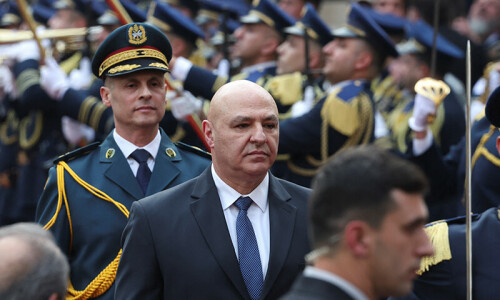NEW DELHI, July 31: India said on Thursday it was willing to return to the negotiating table to work out a new global trade deal but warned it would not make any compromises that could hurt poor farmers.
It also pinned the blame for the talks’ collapse earlier this week in Geneva squarely on the United States.
“The US created the deadlock on an issue which was not trade but related to livelihood of farmers,” Trade Minister Kamal Nath told reporters in the Indian capital following his return from the talks.
“I can negotiate commerce but I cannot negotiate livelihood security,” said Nath, who has been uncompromising in his championing of the cause of India’s small and marginal farmers, saying New Delhi would not sacrifice the interests of its millions of subsistence producers to clinch a global trade pact.
Negotiators gave up on a deal late Tuesday following nine days of fraught discussions in Geneva that capped seven years of seeking a deal in the so-called “Doha” round of liberalising global trade subsidies and tariffs.
The coming months will “see attempts at overcoming the current impasse,” said Nath, who emerged as a pivotal figure at the talks which fell apart due to a deadlock between India and the US over import tariffs and subsidy levels.
“India is ready to be at the table without compromising on issues which concern poor farmers of not only India but 100 other developing countries,” he said.
“I am hopeful the process will restart,” he said, adding, “India stands committed to constructively engage at the WTO to steer the Doha Development Round to a successful conclusion.”
He said discussions might be re-launched within the next few months but gave no fresh ideas on how that might come about.
Analysts have said it seems unlikely that India will soften its stance on agricultural tariffs, as 60 per cent of its population relies on farming for a living and their support is crucial at election time.
Indian Commerce Secretary Gopal Pillai said he did not expect any new talks initiative until after the next US president takes office in January.
Delegates in Geneva had struggled to reach consensus on import tariffs.
India, one of the world’s biggest emerging economies, and the world’s economic superpower, the United States, clashed over how poor nations could hike duties to shelter farmers from a flood of imports.
The United States refused to agree to proposals by India that developing nations should be allowed to boost duties by an additional 25 per cent on farm products if imports surged by 15 per cent. Washington insisted extra duties should be imposed only if imports surged by 40 per cent.
“By the time we have a 40 per cent surge in imports our farmers would have committed suicide,” Nath said, adding, “This trigger was not acceptable.”—AFP















































Dear visitor, the comments section is undergoing an overhaul and will return soon.